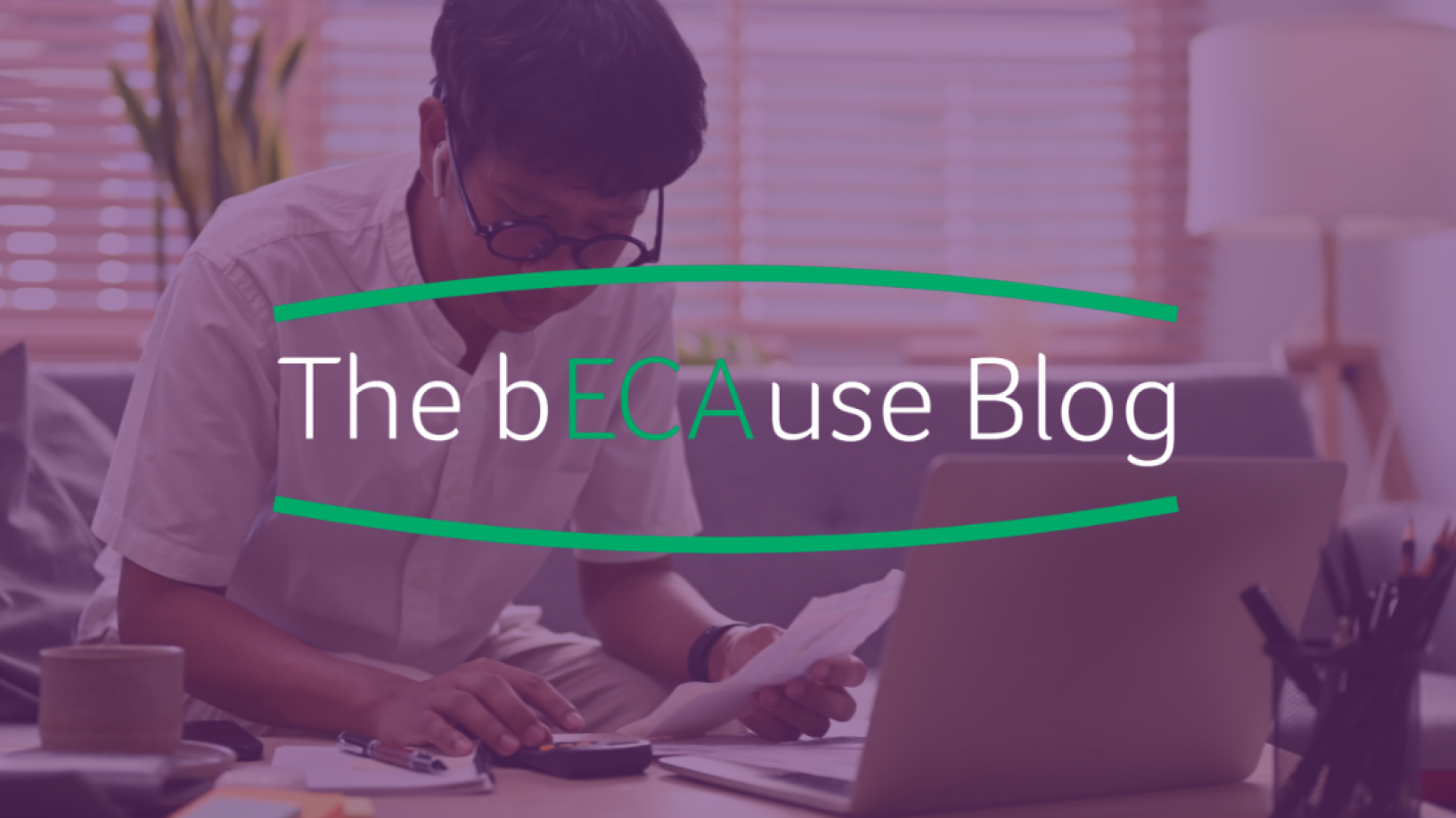The Australian energy system is facing the most significant transformation since its inception.
At the heart of this are consumers who are not only facing major changes about how they consume energy but are increasingly becoming producers of energy themselves. There’s an expectation that every household and small business will need to alter their behaviour to take advantage of when energy is most abundant, to invest in new technologies, and make changes to their homes and businesses to ensure they are as energy efficient as possible.
Consumers clearly have a vital role to play in the successful transition to renewable energy. In the words of Clare Savage, the Chair of the Australian Energy Regulator (AER), “it’s critical that consumers are not left behind and that they feel confident that Australia’s transitioning energy sector is working for them.” But for this to occur, consumers need to trust that everyone else – from governments to networks to regulators – are also playing their part in creating a consumer-centric energy system.
However, we know from our June 2023 Energy Consumer Sentiment Survey (ECSS), that consumers are not feeling that trust. Consumer confidence that the energy industry is working in their long-term interests remains low. Only 35% of households are confident in the energy market, with confidence dropping 9% since the same time last year. Small business confidence is sitting at 46%, down 10% since last year.
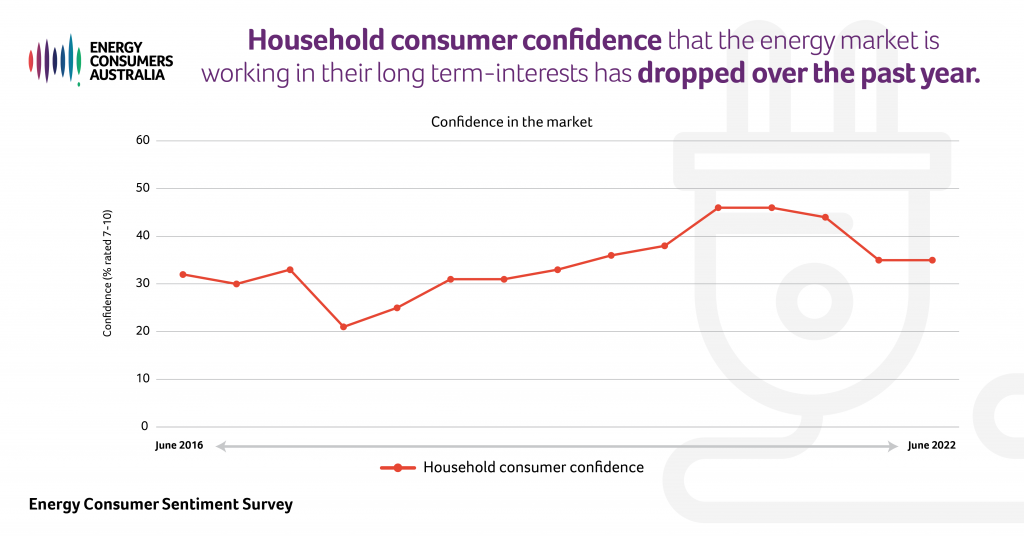
Discover more results from the ECSS
Consumers are concerned about the future
The results show that consumers don’t currently trust the energy market to deliver good outcomes for them. If trust is broken in the present, this is hard to recover and is reflected in ongoing concerns about the future energy market. 59% of households are concerned that in the next three years electricity and gas will become unaffordable for them, up from 51% last year. And they’re also worried about others, with 77% concerned electricity and gas will become unaffordable for some Australians, up from 65% last year.
When we talk about the transition to renewables, we also know from our research that consumers consider technology as vital to its success. Many see the changes they need to make, and those the industry more broadly needs to make, as facilitated through advances in technology, both at a household level through innovations such as smart meters and timers, and through system advances in renewable technologies such as large-scale solar. However, when we asked consumers if they felt confident that, in the next five years, the energy market will make the technological advances needed to help consumers manage energy supply and costs, we saw an 11% drop in the last year for households (41%) and a 10% drop for small businesses (47%).
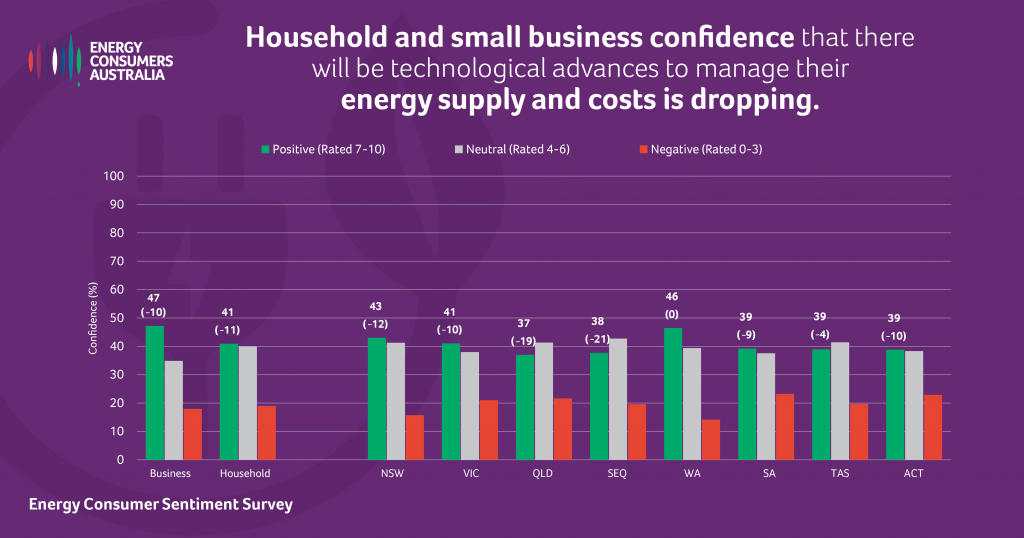
In our survey, we also asked consumers how they think the transition to renewable energy will impact them in the next three years. The latest data from the Australian Energy Market Operator tells us that we’re already seeing wholesale energy costs dropping due to record levels of renewable energy, in particular rooftop solar. But what we heard from consumers is that they are still far from convinced that the energy industry will deliver a system that provides the best outcomes for them.
Only one in ten households think the transition will bring electricity bills down, while more than half think it will make electricity more expensive. Small businesses are slightly more optimistic, with almost a quarter believing the transition will make electricity cheaper.
How consumers think the transition to renewable energy will affect electricity bills in the next 3 years
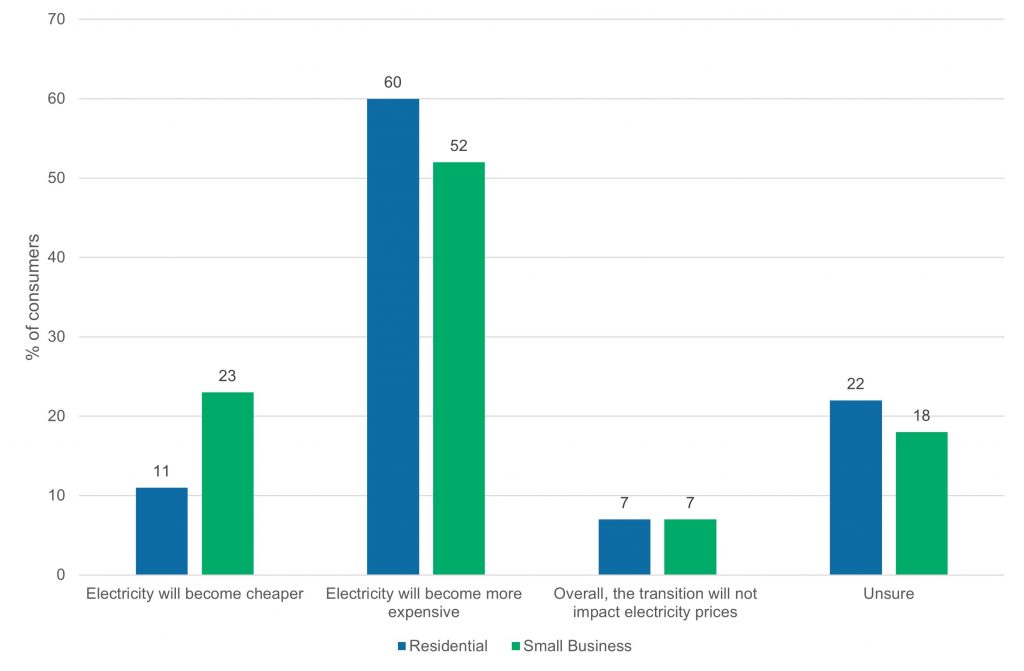
When asked about reliability, respondents were somewhat more divided, however they still aren’t confident. One in five households think the transition will improve reliability and a third think it will make it worse. Again, small businesses are more positive: one third think reliability will improve, and the same number think it will lead to less reliability.
How consumers think the transition to renewable energy will affect electricity reliability in the next 3 years
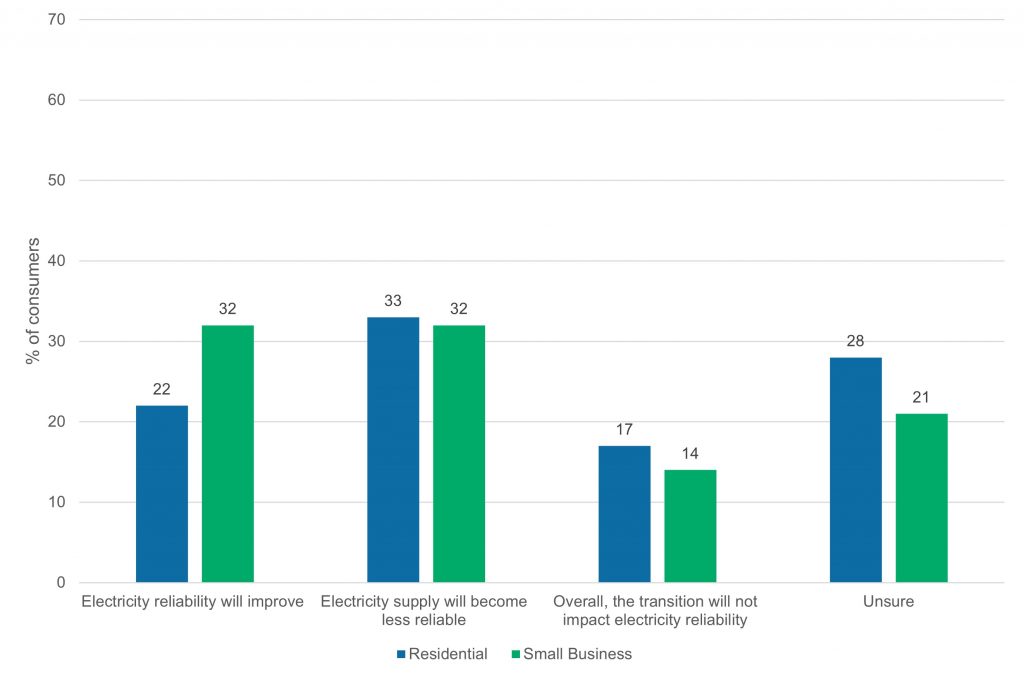
See all the results from the ECSS
Consumers aren’t receiving the information they need on the transition
One in five households and small businesses are unsure how the transition will impact reliability and affordability. This raises questions about whether more can be done to inform consumers about what the transition will look like for them.
We asked respondents whether they had received clear communications (from groups such as Government, retailers, the media and innovators of renewable energy) about how the transition would impact them. Only about one in five households believe they have. Small businesses again were somewhat more positive, with around a third agreeing. This means the majority of consumers feel they are yet to see clear communication on the impacts of the transition on them.
% of consumers who think the following groups have communicated clearly how the transition will affect consumers
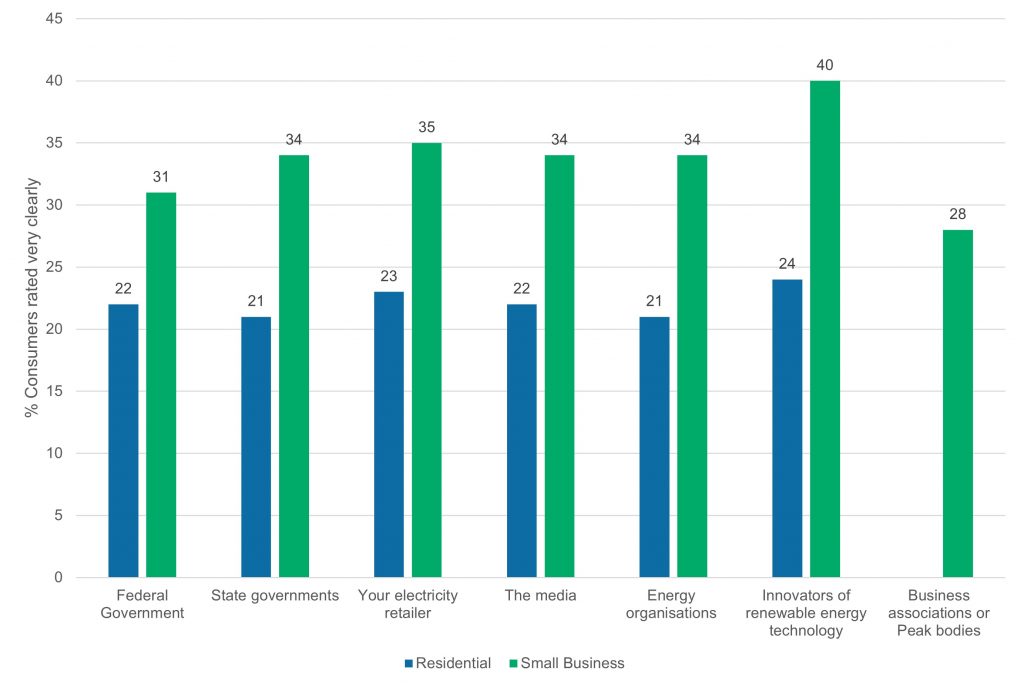
Consumers experiencing disadvantage need tailored communication from trusted channels
We know that accessing information and communication will vary for different sectors of the community. In their Towards Energy Equity Strategy, the AER note the difficulties many Australians face when engaging with energy markets and the need to create a system that supports and works for all consumers. This is especially pronounced for consumers experiencing hardship.
Our research shows that there are cohorts of consumers who are at particular risk of being left behind when it comes to communication about the future. Consumers under financial pressure were less likely to feel they had received clear communications about the impacts of the transition. While 26% of financially comfortable households say they have received clear communications from the Federal Government, this drops to just 15% for households under financial pressure. We also see that older Australians feel less informed than younger Australians or families. Only 17% of retired households think the media has been communicating the transition clearly, which is 13% lower than young households.
Clear and accessible communication is a necessity for all consumers when it comes to managing their energy costs and taking control of their energy use. This is especially pronounced for consumers experiencing disadvantage, who may feel that much of the information currently available is not relevant to them. This emphasises the need for communication to be tailored to consumers’ diverse needs and situations.
Consumers who are less informed feel less positive about the transition
Clear communication is not only important to ensure that everyone can take control of their energy use and bring down their bills, it also shapes how consumers think about the future. Without proper communication about the energy transition, consumers who already feel that the energy market isn’t working in their interests are less likely to think positively about the future. And we see this in how these consumers believe the transition will impact reliability and affordability.
Of the respondents who felt a lack of clear communication about the impacts of the transition, a mere 2% think the transition will bring electricity prices down. These same respondents were also less likely to think reliability will be improved by the transition, at only 11%.
However, there is a positive flip side to this, with consumers who feel more informed also more likely to feel more optimistic about the future. Of the respondents who felt they had received clear communications, 36% thought that electricity will become cheaper with the transition to renewables. 43% thought reliability would be improved and a further 26% thought it will not be affected.
How consumers think the transition will impact electricity affordability depending on how clearly they believe groups have communicated this to them
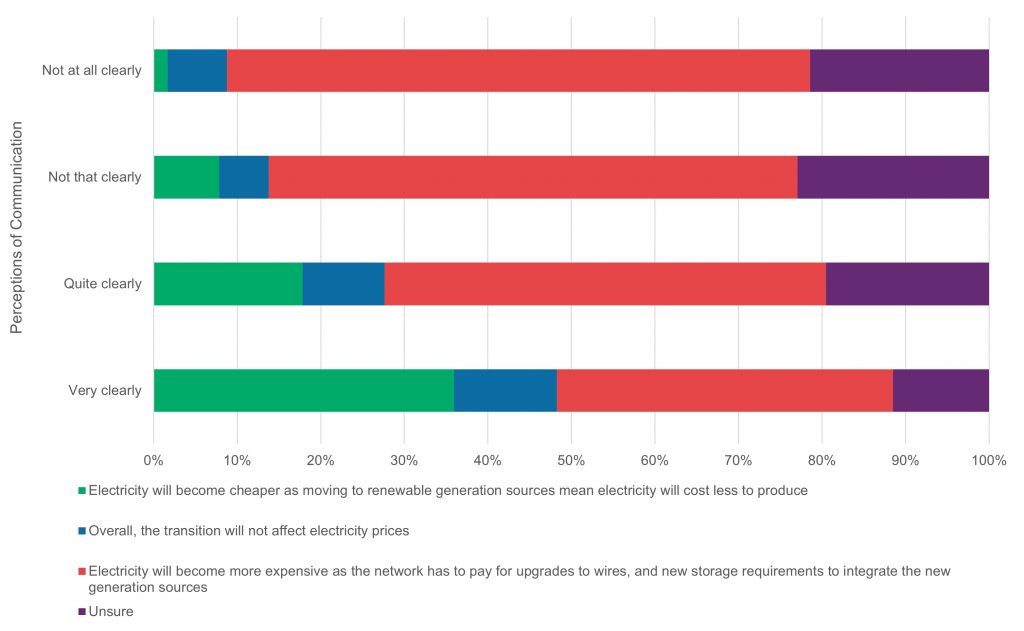
Consumers need to feel that they can rely on the energy industry to provide a system that works for them and meets their diverse needs. We know from our research that consumers who feel they have clear information on the transition are more likely to think positively about it. But we also know that these consumers are in the minority. Coming up with the solution is by no means a simple task. This is especially the case when we consider the complexity of the issues we’re dealing with and the diversity of both individual households and small businesses.
Information on the transition needs to be clear and accessible with a consistent story from industry and government about what consumers’ roles look like, how they can benefit, and how they might be impacted. As we look for ways to improve understanding, we need to ensure consumers are hearing about, seeing, and experiencing an energy system that puts their needs at the centre. This is the only way that we end up with an energy system that benefits and includes everyone.
